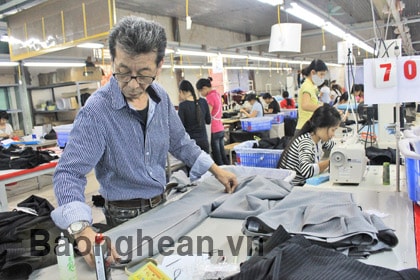Yen Thanh: Two breakthroughs in exploiting rural labor
(Baonghean) -In the total labor force of about 150,000 workers in Yen Thanh, there are about 20,000 - 25,000 surplus workers. If there is no work or lack of work, it is not only a waste of human resources, but also potentially complicated social problems. Labor export is a direction that has brought about certain changes, but each year it only solves about 1,000 people, and there are more and more instabilities, the risk is high, so it cannot be considered a long-term direction and exploited on a large scale. Farming is now basically "mechanized", the surplus time of rural workers is very large.
Mr. Nguyen Viet Hung - Vice Chairman of the District People's Committee said that for Yen Thanh to successfully exploit the current rural labor force, it is necessary to focus on implementing two breakthroughs: On-site labor training and on-site job placement. The government must step in to create a bridge, a connection between workers and craft villages and craft establishments. Next, it is necessary to create a bridge between craft villages and craft establishments with enterprises to consume products and solve output. With that awareness, since 2011, Yen Thanh has successfully experimented with models of bringing straw mushroom production, rattan and bamboo weaving, industrial sewing, farming and livestock farming with the support of science and technology...
According to Mr. Pham Xuan Tuyet - Head of the district's Department of Labor, Invalids and Social Affairs, Yen Thanh is currently striving for the goal of having at least one veterinary officer in each village, hamlet and farm (by 2015, there must be 491 veterinary officers/491 hamlets and villages in the area; currently, there have been approximately 200 people/39 communes and towns). Mr. Doan Van Men, Dong Xoang hamlet, Hoa Thanh commune said that since having a veterinary officer in the hamlet, the work of raising and caring for poultry and livestock has become more proactive. People have started to participate in livestock production in large numbers, many families are confident enough to borrow capital to expand their barns.
For the straw mushroom growing profession, the District People's Committee has invested in building facilities in 6 communes as pilot models, and at the same time organized training for 6 mushroom growing classes with 150 students participating. Engineer Ngo Tri Duy - Head of Yen Thanh Mushroom Breeding Station led us to visit the production facilities of various types of straw mushrooms in the area such as oyster mushrooms, button mushrooms, lingzhi mushrooms, etc. He said: After the 6 models showed good economic efficiency, the district expanded the scope of straw mushroom production to 16 communes, opened 10 more mushroom training classes, bringing the total number of trained mushroom growers to 750 people, thereby attracting a large local workforce.
Next is industrial sewing, Yen Thanh has currently trained over 600 industrial sewing workers to serve the 100% Japanese-owned joint venture sewing factory located in Yen Thanh Town (officially fully operational in the second quarter of 2013). When this factory officially comes into operation, it will need to employ 3,000 industrial sewing workers. In addition, there is a training program for other occupations such as welding, electricity, rattan weaving, vermicelli, incense sticks, etc. for rural workers in 39 communes and towns.

Mr. Muto Masahiro - Japanese expert inspects the products of
MLB TENERGY Company Limited (Yen Thanh Town).
Photo: PB
The next breakthrough, which is of great significance in determining the success of labor training in Yen Thanh, is to arrange for the stable use of local labor. Mr. Ngo Tri Duy - Head of Yen Thanh Mushroom Seed Station said that mushroom growing is very popular among rural laborers in Yen Thanh, due to the large amount of straw from rice cultivation, and mushroom varieties produced at Yen Thanh Mushroom Seed Station; in particular, all finished mushrooms produced are purchased and consumed by the district. Currently, the district produces an average of 20 tons of commercial mushrooms per month.
In addition, industrial sewing has a strong attraction for young workers, especially female workers. Ms. Tran Thi Xuan - lecturer of the short-term sewing class at Yen Thanh Agricultural and Industrial Technical College said that students are very confident in learning the profession because the current demand for industrial sewing labor in Yen Thanh is very large, and students can immediately work at MLB TENERGY Company Limited after completing their studies. Right at Yen Thanh Agricultural and Industrial Technical College, MLB TENERGY Company Limited is borrowing a factory to employ 300 industrial sewing workers as a premise, operating the production of the first source of products.
Thus, the problem of solving employment for rural workers in Yen Thanh can be considered to have found a solution: that is, training local workers and using local workers, in fact, that solution has partly been realized. However, there are still many issues that need to be further addressed. Yen Thanh is a purely agricultural district, the household economic model is still a model with many advantages to maximize the exploitation of the abundant labor resources in the locality, but the support policies and mechanisms in terms of capital, science and technology, facilities, etc. for the household economic model are still limited.
For labor training for industries and occupations related to household economy such as mushroom growing, animal husbandry, cultivation, etc., training courses should not be conducted in a concentrated manner, lasting for 3 months, and should not only be concentrated at the district's Agricultural Technical College, but should be opened directly in communes, at community learning centers in villages and hamlets, etc. to attract a large number of laborers to participate, especially middle-aged laborers and laborers with limited ability to absorb knowledge. There needs to be better coordination between departments, branches, and levels in the political system and government apparatus to join in strongly, in order to remove difficulties and obstacles for rural laborers, for labor employers, and craft villages, etc.
Ngo Kien






